Justin Taylor's Blog, page 211
May 22, 2012
Dictionary of the Old Testament Prophets: 72-Hour Sale
May 21, 2012
Passing the Pastoral Baton Well
Jason Meyer’s letter of acceptance—along with a letter from his wife, Cara—to the people of Bethlehem Baptist Church, after the vote (784-8) to call him as associate pastor for preaching and vision.
Here is the letter from John Piper that was read to the congregation, and Piper’s response after the vote—along with a journal entry of praise to God for his faithfulness to his church.
Alvin Plantinga’s Apologetics for Dummies
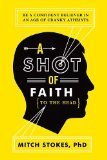 James Anderson reviews Mitch Stokes’s A Shot of Faith (to the Head): Be a Confident Believer in an Age of Cranky Atheists (Thomas Nelson, 2012).
James Anderson reviews Mitch Stokes’s A Shot of Faith (to the Head): Be a Confident Believer in an Age of Cranky Atheists (Thomas Nelson, 2012).
Here’s the opening:
Mitch Stokes and I have a number of things in common. We were both engineers before taking a left-turn (or perhaps a right-turn) into philosophical theology. We’re both conservative Reformed believers. We both think highly of the Christian philosopher Alvin Plantinga. We both want to take the New Atheism seriously, but not too seriously. And we both think that A Shot of Faith (to the Head) provides powerful ammunition for believers who want to respond to outspoken critics and skeptics. There is, however, one regrettable difference between us: Stokes wrote the book, whereas I can only wish I’d written it.
A Shot of Faith (to the Head) essentially distills and popularizes Plantingan apologetics. Plantinga doesn’t style himself as a Christian apologist, or present his writings as primarily apologetical, yet he has devoted much of his career over the last five decades to defending the rationality of Christian faith. His books, while analytically rigorous and profound, are also remarkably lucid, accessible, and witty. Until now, however, no work has condensed and synthesized Plantinga’s arguments into one coherent apologetic targeted at the New Atheists and their ilk. Stokes’s book does exactly that, and with the same relaxed and playful humor that one finds in Plantinga’s writings.
You can read the whole review here.
Here’s a book trailer:
Three Forthcoming Books from InterVarsity Press
A few weeks ago I highlighted three forthcoming books from Baker Academic that might be of interest to some readers.
Here below are three forthcoming books from IVP that caught my eye. The one by Peterson is due out in July; the ones by Kapic and Reeves are coming in September 2012.
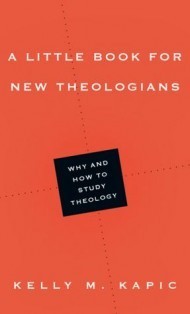 Kelly Kapic, A Little Book for New Theologians: Why and How to Study Theology.
Kelly Kapic, A Little Book for New Theologians: Why and How to Study Theology.
“Whenever we read, think, hear or say anything about God, we are doing theology. Yet theology isn’t just a matter of what we think. It affects who we are. In the tradition of Helmut Thielicke’s A Little Exercise for Young Theologians, Kelly Kapic offers a concise introduction to the study of theology for newcomers to the field. He highlights the value and importance of theological study and explains its unique nature as a serious discipline. Not only concerned with content and method, Kapic explores the skills, attitudes and spiritual practices needed by those who take up the discipline. This brief, clear and lively primer draws out the relevance of theology for Christian life, worship, mission, witness and more. ‘Theology is about life,’ writes Kapic. ‘It is not a conversation our souls can afford to avoid.’”
You can read the contents here.
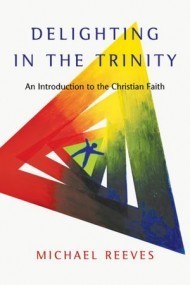 Michael Reeves, Delighting in the Trinity: An Introduction to the Christian Faith.
Michael Reeves, Delighting in the Trinity: An Introduction to the Christian Faith.
“If you have ever felt that the doctrine of the Trinity was a liability, a burden to be borne patiently, this is the book that will change your perspective. Michael Reeves’s Delighting in the Trinity presents the triune God as the best thing about the Christian faith. Convinced that ‘the triunity of God is the secret of his beauty,’ Reeves writes from a full heart, with contagious enthusiasm for the Trinity. Delighting in the Trinity is more stimulating, quotable and engaging than we usually expect a theology book to be. Page after page, Reeves finds new ways of talking, draws surprising connections and reminds us that the God of the gospel is good news in three persons.”
—Fred Sanders, Biola University, author of The Deep Things of God: How the Trinity Changes Everything
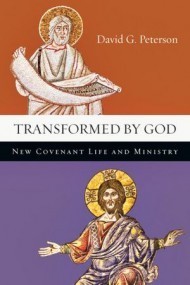 David Peterson, Transformed by God: New Covenant Life and Ministry.
David Peterson, Transformed by God: New Covenant Life and Ministry.
“Those familiar with the work of David Peterson will know what to expect from any book he writes: careful exegesis, attention to biblical theology, doctrinal synthesis and practical application. This book does not disappoint in any of these areas as David expounds the nature of the Christian life within biblical-theological context. This is Christian scholarship at its best–in the service of the church.”
—Carl R. Trueman, Paul Woolley Professor of Church History, Westminster Theological Seminary, Philadelphia
“David Peterson’s study Transformed by God is a careful, highly competent, biblically faithful and pastorally astute treatment of Jeremiah 31:31-34 and its New Testament resonances, with the New Testament illuminatingly identified as new covenant literature. A fine example of scholarship that serves the church in general and pastors in particular. Highly recommended!”
—Dr. Graham A. Cole, Anglican Professor of Divinity, Beeson Divinity School, Samford University
“Then You Shouldn’t Do It At All”
Michael Hyatt:
A few years ago, I taught a seminar on blogging at one of our trade shows. The CEO from one of the largest companies attended. Afterward, he came up and introduced himself. He asked if we could have breakfast the next morning. “Sure,” I said.
So the next morning we met. He asked, “How do I get started blogging?” My heart leapt. I knew he would have an instant audience. I, for one, would love to read what he had to say. I imagined all kinds of things I could learn from him.
Then he dashed my hopes. “Who ghostwrites your blog?” he asked.
“Excuse me?” I choked.
“I mean, who do you use to write your blog? Could I possibly hire him or could you recommend someone who is really good?”
Honestly, I couldn’t believe what I was hearing. The guy obviously did not get it. I blurted out, “I don’t use a ghostwriter. I write every word myself.”
“Oh, I couldn’t possibly do that,” he said. “I don’t have the time.”
Without thinking, I said, “Then you shouldn’t do it at all.”
—Michael Hyatt, Platform: Get Noticed in a Noisy World: A Step-by-Step Guide for Anyone with Something to Say or Sell (Thomas Nelson, 2012), p. 81.
May 18, 2012
The PCA Study Committee Report on Translating “Son of God” in Muslim Contexts
The PCA’s Study Committee on Insider Movements has submitted the first part of their report (to be acted upon at the General Assembly in June). This first installment is entitled “Like Father, Like Son: Divine Familial Language in Bible Translation.”
It’s an 89-page PDF. Here is a summary of their conclusion:
Bible translations geared for Islamic contexts should not be driven by concerns that Muslims may recoil from biological terms applied to God or Jesus. That revulsion originates primarily out of religious conviction, not any communicative limitation of the terms themselves. The essentially biological terms (Hebrew, ben and ab; Greek, huios and pater) are divinely given and therefore should be translated into comparable biological terms. Footnotes, parentheticals and other paratextual comments may be used to explain the biblical and theological riches of Scripture, while never subverting the important truths embedded in the biological contours of Scripture’s words.
Not all translation workers share these methodological commitments. Therefore, churches should carefully assess the philosophies and practices of translation workers whom they support. Churches should direct resources toward faithful translation and, if loving attempts at correction fail, away from projects and persons advocating problematic approaches to translation. For the honor of the God who has revealed himself in his Word, churches and agencies involved in translation should collaborate to improve the spread of the Christian message worldwide, ensuring that Bibles oriented towards those in Muslim contexts retain the fullest range of theological meanings resident in the original languages.
The responsibility for faithful translation and worldwide gospel proclamation rests finally in the church of Jesus Christ.
Those interested in this topic should be aware that this November Crossway will publish a new book by D. A. Carson entitled Jesus the Son of God: A Christological Title Often Overlooked, Sometimes Misunderstood, and Currently Disputed, and the last chapter will look at this specific issue.
Readers may also want to know about a recent interview that Collin Hansen conducted with John Piper on the insider movement in general.
Classical School Reading List: Grades 1-8
 Here’s the final post on this. I’ve now put all the lists in one 13-page printable PDF document with hyperlinks and a spot to check off books that are acquired.
Here’s the final post on this. I’ve now put all the lists in one 13-page printable PDF document with hyperlinks and a spot to check off books that are acquired.
Again, I’ve tried my best to link to the best texts at the cheapest prices on Amazon. But of course many of these books can also be found in libraries, used bookstores, thrift stores, etc.
Happy reading!
Alan Jacobs on How to Read a Book
Philip Ryken and Jeffry Davis recently presented a surprise book in honor of Leland Ryken, Liberal Arts and the Christian Life (Crossway, 2012). One of the essays, by Alan Jacobs, is on “How to Read a Book” (which you can read online for free). It’s a delightful essay that is a great companion piece to the two books I would recommend on the subject: Mortimer Adler’s How to Read a Book and Tony Reinke’s Lit! A Christian Guide to Reading Books.
Professor Jacobs opens with Francis Bacon’s wonderful quote:
Some books are to be tasted,
others to be swallowed,
and some few to be chewed and digested;
that is, some books are to be read only in parts;
others to be read, but not curiously;
and some few to be read wholly, and with diligence and attention.
That schema structures the rest of the essay. I’ve included an outline with some notes below, but I’d encourage you to read the whole thing. Parents and teachers, this would be a wonderful essay to require students to read.
Discernment. “Not all books deserve the same attention from us. . . . Skimming is really the first stage in the discernment I am recommending: we skim a book to find out whether it appears to be genuinely substantive—to find out whether it deserves more than a skim. . . . You should rarely plan to skim. . . . How do we really chew and swallow a book so that we get the maximum nourishment from it? Three things are needful: . . . “
Attentiveness. “This requires a determination to make our attention as full as we can make it, not partial, which, in turn, requires us to shut down the computer and put the phone (set to ‘silent’) well out of reach. After all, how would you feel if you were opening your heart to a friend who claimed to be listening but never stopped texting or updating his Facebook page? Attentiveness is an ethical as well as an intellectual matter; it’s about treating our neighbors as they deserve as much as it’s about getting facts into our heads.”
Responsiveness. “When you’re pouring out your heart to others, you don’t want them just to nod and repeat your last few words. You want them to offer their own words, as an indication that they have heard you and thought about what you’ve said—have processed it in some meaningful way. This is what writers want also: for you to ‘enrich their words’ with your own responses. And this is the main reason to read books, especially difficult and challenging books, with a pencil in your hand: not primarily so that you can remember what you’ve read—though that is nice—but so you can register your reaction.”
Charity. “Reading calls for charity because everything we do calls for charity—if by ‘charity’ we mean, as we should, Christian love. . . . Sometimes charity requires us to be challenging and at times even skeptical. . . . Charity begins with the two traits we have already mentioned: attentiveness and responsiveness.
Whim. “We should affirm the great value of reading just for the fun of it. . . . In my experience, Christians are strangely reluctant to take this advice. We tend to be earnest people, always striving for self-improvement, and can be suspicious of mere recreation. But God doesn’t just create, he takes delight in his creation, and expects us to delight in it too; and since he has given us the desire to make things ourselves—has allowed us to be “sub-creators,” as J. R. R. Tolkien says13—we may rightly take delight in the things that we (and others) make. Reading for the sheer delight of it—reading at whim—is therefore one of the most important kinds of reading there is.” (For more on this, see Jacobs’s The Pleasures of Reading in an Age of Distraction .)
A Major New Defense of a More Biblical Way than Dispensationalism or Covenant Theology
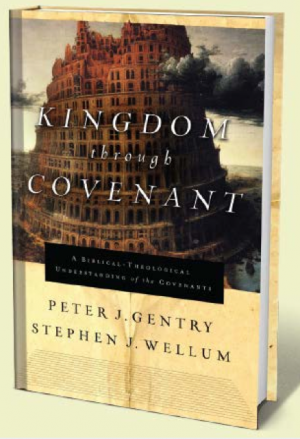 Peter J. Gentry (Old Testament professor at Southern Seminary) and Stephen J. Wellum (systematic theology professor at Southern) have co-authored a groundbreaking book, offering a robust and detailed biblical theology of the covenants, entitled Kingdom through Covenant: A Biblical-Theological Understanding of the Covenants. Crossway will publish it in June. Amazon is currently selling it for 51% off, though I imagine the discount will drop once it’s actually published.
Peter J. Gentry (Old Testament professor at Southern Seminary) and Stephen J. Wellum (systematic theology professor at Southern) have co-authored a groundbreaking book, offering a robust and detailed biblical theology of the covenants, entitled Kingdom through Covenant: A Biblical-Theological Understanding of the Covenants. Crossway will publish it in June. Amazon is currently selling it for 51% off, though I imagine the discount will drop once it’s actually published.
My prediction is that among serious students of God’s word this will become a much-discussed and debated book. I suspect their “progressive covenantalism” (which I think is right) will change some paradigms, similar to the way in which progressive dispensationalism has made dispensationalism more tethered to biblical theology. At nearly 850 pages, virtually no stone is left unturned as Gentry works through each of the covenants in painstaking detail, and Wellum frames the book in terms of theology, theological systems, typology, hermeneutics, and implications for the church and the Christian life.
Here are some of the commendations:
“Gentry and Wellum offer a third way, a via media, between covenant theology and dispensationalism, arguing that both of these theological systems are not informed sufficiently by biblical theology. Certainly we cannot understand the scriptures without comprehending ‘the whole counsel of God,’ and here we find incisive exegesis and biblical theology at its best. This book is a must read and will be part of the conversation for many years to come.”
—Thomas R. Schreiner, James Buchanan Harrison Professor of New Testament Interpretation, The Southern Baptist Theological Seminary
“Kingdom through Covenant is hermeneutically sensitive, exegetically rigorous, and theologically rich—a first rate biblical theology that addresses both the message and structure of the whole Bible from the ground up. Gentry and Wellum have produced what will become one of the standard texts in the field. For anyone who wishes to tread the path of biblical revelation, this text is a faithful guide.”
—Miles V. Van Pelt, Alan Belcher Professor of Old Testament and Biblical Languages and Director, Summer Institute for Biblical Languages, Reformed Theological Seminary
“Gentry and Wellum have provided a welcome addition to the current number of books on biblical theology. What makes their contribution unique is the marriage of historical exegesis, biblical theology, and systematic theology. Kingdom through Covenant brims with exegetical insights, biblical theological drama, and sound systematic theological conclusions. Particularly important is the viable alternative they offer to the covenantal and dispensational hermeneutical frameworks. I enthusiastically recommend this book!”
—Stephen Dempster, Stuart E. Murray Associate Professor of Religious Studies, Atlantic Baptist University
Matthew Claridge at Credo Magazine has a very helpful and informative interview with the authors about what they are seeking to accomplish—first with Wellum, then with Gentry.
Here is one of the interactions with Gentry:
In a summary fashion, what do you think is the most distinctive aspect of your approach to the covenants in contrast to other standard “covenantal” readings such as Covenant Theology?
What I think we have been able to do is, first of all, take the basic passages in the Scriptures that deal with the major covenants and given them a completely fresh exegesis based upon four things: 1) looking at the cultural setting; 2) looking at the linguistic data; 2) looking at the literary structures in the text; and 4) always keeping an eye on the relationship of the passage with the metanarrative or plot line of Scripture.
When I look at the books out there on the covenants, there hasn’t been any fresh exegesis of the key passages in over 40 years. For example, scholars in the school of Covenant Theology continue to refer to the work of Meredith Kline, but a great deal of more information has been developed in the last several decades that requires a new, fresh approach. There has been tremendous advances in our understanding of the cultural setting of the ANE (economic, political, social, religious background and historical events) and in the area of linguistic analysis, particularly in the field of “discourse grammar.” In terms of literary structures, I have read most of the books on the market today unpacking covenantal structures, and I don’t see a rigorous interaction with the shape of the text.
Secondly, we have zeroed in on many passages in the Bible that discuss the relationships between one or two covenants together and explain the implications of this phenomena for a whole-Bible theology. If we collect these passages and pay attention to them, then we are enabled to put the covenants together in a structure that comes from the Bible and not from our own imagination. The problem with both Covenant Theology and Dispensationalism, is that ultimately, the meta-narrative they are providing is not the meta-narrative of the Bible. It owes too much to a story outside the Scripture and to the times in which they were developed. Our goal is to uncover a methodology that will tell me if my meta-narrative is more true to the Bible than another.
Today, there are many books available dealing with “four views” of one thing or another. The contributors typically provide their “view” out of how they put the Bible together and not simply out of collecting proof-text. Unless we find a way to adjudicate whether one metanarrative is better than another or truer to Scripture than another, we will not get beyond this impasse. At the end of the chapters to which I contribute in Kingdom Through Covenant, I am careful to relate the discussion to the rest of the biblical story and covenants.
And here is one of the exchanges with Wellum:
Covenant theology and Dispensational theology draw two different conclusions from the New Covenant. The former collapses Israel into the church and the latter excludes Israel from the church. Where’s the error here?
We believe the error is ultimately found in Christology.
That may seem strange so let me explain.
As one works through the biblical covenants, all of the covenants and their mediators find their fulfillment in Christ. In Christ he is the last Adam, Abraham’s true seed, the true Israel who obeys completely, and David’s greater Son who does what no Davidic king ever did. In this way, all the promises to “Israel” as the “son” of God and typological pattern of Christ are fulfilled. Israel, in her role, loses nothing but finds her fulfillment perfectly in Christ.
Dispensational theology often fails to recognize this point and thus does not see how Israel as a nation is the type which points forward to Christ as the antitype, and that the church now in relationship to Christ receives all the promises of God in and through her covenant head. In this way, dispensational theology fragments Israel and church because she does not unite them properly in Christ.
Covenant theology, in our view, grasps the Israel to Christ relationship better, but then does not see properly how the genealogical principle is transformed as Christ, the new covenant head, brings all the previous covenant mediators to their end, and stands as the head of his believing people. She does not also see that the covenant communities are also different, due to the difference between the old and new covenants. In this way, covenant theology moves from Israel to the church too fast, without first seeing how the covenants find their consummation in Christ, the true Israel, and thus the newness and greatness of what Jesus has won as our new covenant head, including the difference in the nature and structure of the covenant communities.
In the end, we believe that the root problem of both systems is that they do not sufficiently trace out how the biblical covenants unfold, how all the types and patterns of the OT are fulfilled in Christ, and thus the better nature of the covenant our Lord Jesus has inaugurated.
Justin Taylor's Blog
- Justin Taylor's profile
- 44 followers




